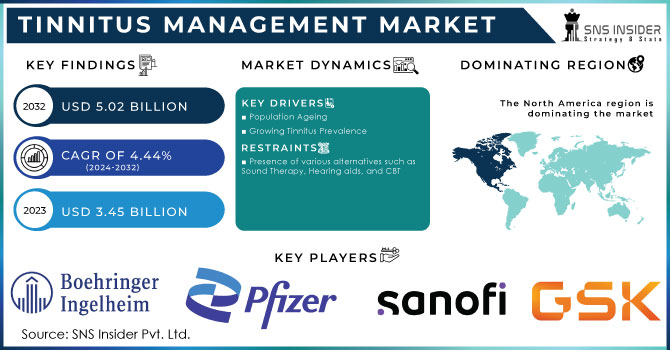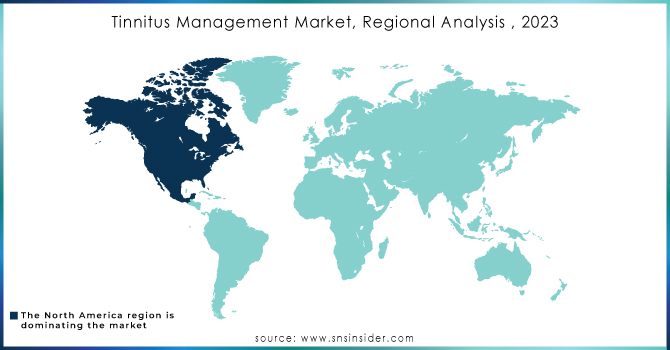Tinnitus Management Market Report Scope & Overview:

To Get More Information on Tinnitus Management Market - Request Sample Report
The global tinnitus management market, valued at USD 3.45 Billion in 2023, is projected to reach USD 5.02 Billion by 2032, growing at a compound annual growth rate CAGR of 4.44% during the forecast period.
A frequent issue, tinnitus can negatively affect a person's quality of life. The market for managing tinnitus includes a variety of products, including medical equipment, medications, sound therapy equipment, and counseling services.
The industry dedicated to creating and offering goods and services to assist people in managing and reducing the symptoms of tinnitus is referred to as the tinnitus management market. The feeling of ringing, buzzing, or other sounds in the ears or head without any external cause is known as tinnitus. It has a large global influence and may have a detrimental effect on people's quality of life. The market for tinnitus management has a wide range of products and strategies to treat the illness.
When there is no external source of sound, a condition known as tinnitus causes the perception of sound. In the ears or head, it may sound like ringing, buzzing, hissing, or another sound. There are several products and strategies available on the market for tinnitus management that aim to reduce symptoms and enhance the quality of life for those who experience it. There are many different products available on the market, including cochlear implants, sound therapy equipment, hearing aids, and medications created especially for the treatment of tinnitus. These items are made to either cover up the tinnitus sound or offer relief by addressing its underlying causes or mechanisms.
MARKET DYNAMICS
KEY DRIVERS:
-
Population Ageing
-
Growing Tinnitus Prevalence
Tinnitus is a widespread condition that affects a large percentage of the world's population, with estimates ranging from 15% to 20%. The demand for efficient management solutions is being driven by the increasing prevalence of tinnitus.
RESTRAIN:
-
Presence of various alternatives such as Sound Therapy, Hearing aids, and CBT
approaches can assist people in controlling their emotional and psychological reactions to tinnitus, thereby minimizing the distress brought on by the disease. While there isn't a single drug licensed to cure tinnitus, some drugs may be recommended to alleviate its side effects, like anxiety, sadness, or insomnia.
OPPORTUNITY:
-
Growing Awareness
-
Technology developments
New developments in technology could completely change the tinnitus management sector. To alleviate the symptoms of tinnitus, cutting-edge products including wearable technology, hearing aids, and sound treatment equipment are being created. These developments may give businesses new chances to launch efficient and usable products.
CHALLENGES:
-
Limited knowledge and comprehension
-
Lack of available effective treatments
Tinnitus is a complex ailment for which there is not yet a single, all-encompassing remedy. Instead of treating the underlying cause of tinnitus, many currently used treatment methods concentrate on managing symptoms. This restricts the choices that medical providers and patients have, which causes irritation and discontent.
IMPACT OF RUSSIA-UKRAINE WAR
The war between Russia and Ukraine has had a profound geopolitical and humanitarian impact on the area. It is crucial to remember that the effect on the market for tinnitus management may not be as immediate or significant. The violence may have caused the hospitals, clinics, and medical supply networks in the impacted areas to become disrupted. Access to products and services for tinnitus control may be hampered as a result of this disturbance.
Populations affected by armed conflicts frequently experience increased stress and anxiety. For some people, stress can make their tinnitus symptoms worse. Consequently, a rise in stress levels is brought on by tinnitus management.
IMPACT OF ONGOING RECESSION
Because of job losses, wage reductions, or overall economic instability, people typically have less disposable income during recessions. People could prioritize necessities over optional healthcare items or services, such as tinnitus management strategies, as a result. This might cause consumers to spend less on tinnitus management items.
As people and healthcare institutions trim their budgets, recessions frequently lead to a decline in overall healthcare spending. non-emergency medical treatment.
IMPACT OF COVID-19
According to a study that was published in the Frontiers in Public Health journal, 40% of persons with signs of Covid-19 reported that their tinnitus had gotten worse. Health-related worries, social isolation limits, lifestyle changes, and mental health issues were just a few of the causes that contributed to a rise in tinnitus during the pandemic. These have A small increase in the market for tinnitus management. The overall market growth in all the major regions was hampered by the disruption of the supply chain, lower demand, slowdowns, staff shortages, restrictions on indoor and outdoor events, and slowdown. In the tinnitus management market, however, Future predictions call for a steady recovery and modest growth.
KEY MARKET SEGMENTATION
By Product
-
Devices
-
Sound Masking Devices
-
Notched Music Devices
-
-
Drugs
-
Tricyclic Antidepressants
-
Antianxiety
-
Anticonvulsants
-
By Indication
-
Subjective Tinnitus
-
Objective Tinnitus
By Distribution Channel
-
Audiology Centers
-
ENT Clinics
-
Hospitals
-
E-Commerce
REGIONAL ANALYSIS
The North American tinnitus management market held the global market share. Due to the high prevalence and rise in tinnitus incidence as well as the sharp increase in the number of geriatric populations, the U.S. is expected to continue to dominate.
The quick uptake of numerous initiatives to standardize the results of tinnitus therapy is the main driver of boosting market growth in the US. The market for tinnitus management in the United States will benefit from this.
By 2021, it is anticipated that the U.K. will win the European market. One of the main causes of the rise in demand for tinnitus treatment in the U.K. is technological developments in medical devices.

Do You Need any Customization Research on Tinnitus Management Market - Enquire Now
REGIONAL COVERAGE:
North America
-
USA
-
Canada
-
Mexico
Europe
-
Germany
-
UK
-
France
-
Italy
-
Spain
-
The Netherlands
-
Rest of Europe
Asia-Pacific
-
Japan
-
South Korea
-
China
-
India
-
Australia
-
Rest of Asia-Pacific
The Middle East & Africa
-
Israel
-
UAE
-
South Africa
-
Rest of the Middle East & Africa
Latin America
-
Brazil
-
Argentina
-
Rest of Latin American
Key Players
Some of the major players listed as follows, Teva Pharmaceutical, Pfizer Inc., Sanofi, GlaxoSmithKline, Eli Lilly and Co., Bayer AG, Boehringer Ingelheim, Merck & Co., Abbivie, Widex A/S, Oticon Inc., Starkey Laboratories, Inc., GN Hearing A/S, Neuromod Devices Ltd., Neuromonics, Inc., Takeda Pharmaceutical Company Ltd., Puretone Ltd., Signia, and others.
RECENT DEVELOPMENTS
-
An innovative hearing aid platform called Augmented Xperience (AXE) has been launched by a renowned provider of hearing solutions. It automatically and intelligently analyses sound to ensure that users always hear clear sound, no matter the listening setting.
| Report Attributes | Details |
| Market Size in 2023 | US$ 3.45 Bn |
| Market Size by 2032 | US$ 5.02 Bn |
| CAGR | CAGR of 4.44% From 2024 to 2032 |
| Base Year | 2023 |
| Forecast Period | 2024-2032 |
| Historical Data | 2020-2022 |
| Report Scope & Coverage | Market Size, Segments Analysis, Competitive Landscape, Regional Analysis, DROC & SWOT Analysis, Forecast Outlook |
| Key Segments | • By Product (Devices, Drugs) • By Indication (Subjective Tinnitus, Objective Tinnitus) • By Distribution Channel (Audiology Centers, ENT Clinics, Hospitals, E-Commerce) |
| Regional Analysis/Coverage | North America (USA, Canada, Mexico), Europe (Germany, UK, France, Italy, Spain, Netherlands, Rest of Europe), Asia-Pacific (Japan, South Korea, China, India, Australia, Rest of Asia-Pacific), The Middle East & Africa (Israel, UAE, South Africa, Rest of Middle East & Africa), Latin America (Brazil, Argentina, Rest of Latin America) |
| Company Profiles | Teva Pharmaceutical, Pfizer Inc., Sanofi, GlaxoSmithKline, Eli Lilly and Co., Bayer AG, Boehringer Ingelheim, Merck & Co., Abbivie, Widex A/S, Oticon Inc., Starkey Laboratories, Inc., GN Hearing A/S, Neuromod Devices Ltd., Neuromonics, Inc., Takeda Pharmaceutical Company Ltd., Puretone Ltd., Signia |
| Key Drivers | • Population Ageing • Growing Tinnitus Prevalence |
| Market Opportunities | • Growing Awareness • Technology developments |

